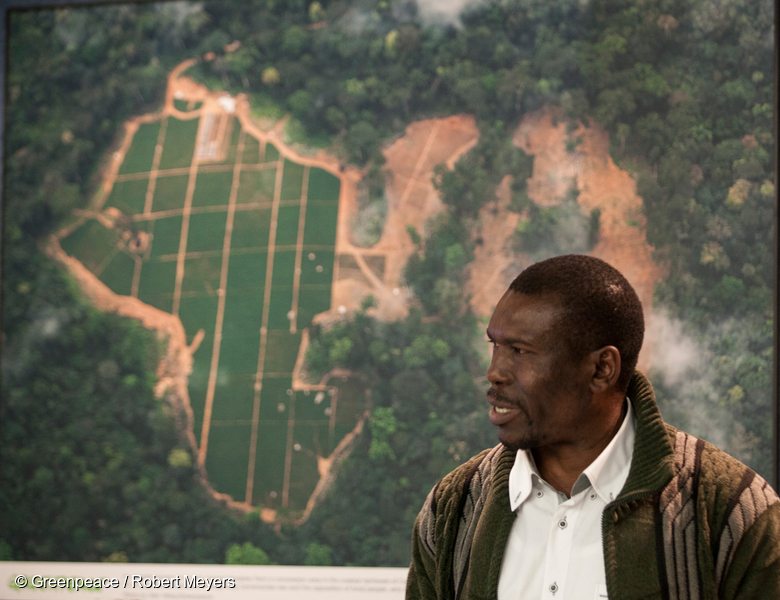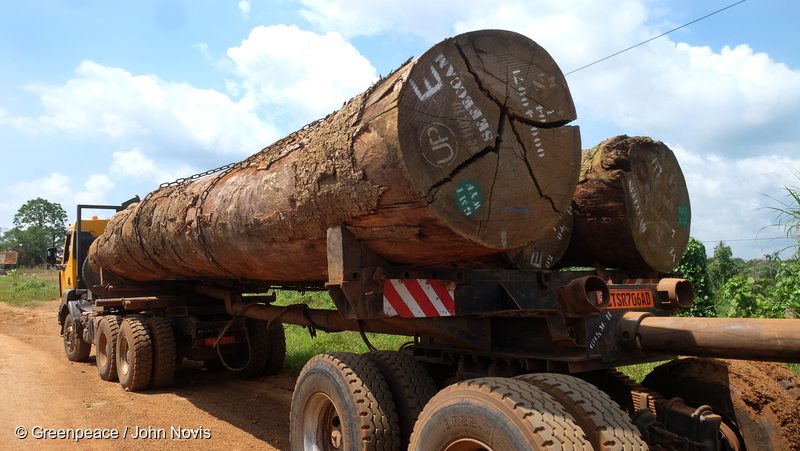This article is written by Amy Moas and Eric Ini and was originally published by Greenpeace Africa.
When Greenpeace and our allies first introduced you to Herakles Farms and its palm oil project in Cameroon (known locally as SG Sustainable Oils Cameroon or SGSOC), the U.S. company had grand and destructive ambitions. Before even obtaining a valid land lease, local residents and civil society opposed the plans. The company was intent on destroying nearly 70,000 hectares of dense natural forest in southwest Cameroon — an area that provided livelihoods to thousands of people and a home to endangered wildlife like the chimpanzee and drill.
More than three years on, the concession area is a fraction of the intended size and the company has closed most of its offices, resorting to selling illegally felled timber to raise revenue. But if its ambitions have changed or evolved, they are no less destructive. Now, SGSOC appears to be desperately using the courts, physical assaults and intimidation to attack citizens exercising rights guaranteed in their constitution and under international law.

Nasako Besingi speaks about the impacts of the Herakles Farms Palm Oil plantation development on his community and environment at a 2013 press briefing in Washington, DC.
Where Peaceful Protest Is a Crime
Nasako Besingi — a local activist who has won international awards for his peaceful protests against the Herakles Farms/SGSOC palm oil project — was convicted on four charges last week, including defamation and propagation of false publications. After many judicial delays and concerns over the fairness and validity of the Cameroonian legal system to adjudicate this case, he was ordered to pay a huge fine and legal costs or face three years in jail.
Besingi is guilty of nothing more than exercising his democratic right to protest, which is why this crackdown is so alarming. Herakles Farms/SGSOC has consistently worked to silence its critics, and Besingi has been intimidated and physically assaulted in recent years. A coalition of environmental and human rights organizations is calling on Cameroon to stop the repression of local citizens and activists for merely expressing concern over their own land and forests.
Where the Voice of Opponents Is Silenced by All Means
But while this injustice was taking place, new information surfaced about a number of complaints and lawsuits that Herakles Farms/SGSOC itself faces.
More than 60 former employees have turned to local activists, including Nasako Besingi, for help securing unpaid allowances and a number of employees have reportedly brought lawsuits against the company. One former employee has filed at least eight different actions, including accusations of racial discrimination and unpaid wages.
Herakles Farms/SGSOC’s defense in response to these legal actions has recently come to light and includes an arbitration clause in its employment contracts which designates the “New York Arbitration Board” as the only authorized body to hear complaints.
This condition that an employee can only take up a grievance in a foreign country places an unfair insurmountable burden on employees and is rather strange given Herakles Farms no longer has an office in New York. New leadership suggested the U.S. arm of the company may no longer be involved in this project at all.
The company has even asked the presidency of Cameroon for help enforcing this arbitration clause and to intervene in stopping the court cases against Herakles Farms/SGSOC.
Herakles Farms/SGSOC’s efforts to intimidate and silence the voices of opponents, while also trying to gain influence at the upper hierarchy of the government, is violating the independence of the judiciary and freedom of legal proceedings.
Where Local Development Is an Illusion
Herakles Farms/SGSOC’s behaviour is in stark contrast to their public rhetoric when they first announced their project. Once boasting of bringing much needed local economic development, the project is now evidently in full crisis.
This year employees were told that Herakles Farms was stopping operations in the villages of Mundemba and Toko in order to intensify planting in nearby Nguti. But all activity appears to have stopped throughout their concession. The main office of Herakles Farms/SGSOC in Limbe had been shut down, with a small new office being set up in Manyemen.
Satellite images from January to May 2015 reveal that roughly 50 hectares of forest cover were lost in the Herakles Farms/SGSOC concession, indicating little development has taken place. No one can even confirm if the company ever paid their land rent, totaling more than $300,000. However, Greenpeace Africa was able to confirm that they were served with a summons in May this year for unpaid taxes of more than $38,000.
In addition to laying off workers — for many of whom the job was all they had after the company took control of their land — local chiefs in surrounding communities have also argued that social obligations promised by the company were not fulfilled.
An Attempt to Resurrect the Palm Oil Project
In the face of steadfast opposition and this series of resulting challenges, Herakles Farms has finally gotten the message and decided it is not welcome. Greenpeace Africa confirms that Jonathan Watts has been named the new Chief Operating Officer of SGSOC and the project has new investors. Watts is also the managing director of the Volta Red palm oil project in Ghana, which was also previously owned by Herakles Farms and is part of the U.K.-based Wyse Group.
The full implications of this change of management and ownership remain unclear, but this project is and has always been the wrong project in the wrong place. It is an example of how not to invest in and produce palm oil in Cameroon.
Greenpeace Africa remains dedicated to highlighting the importance of effective land use planning in Cameroon and the wider Congo Basin in a way that respects the rights of local communities, forges a sustainable path toward development and does not come at an environmental or human cost.




